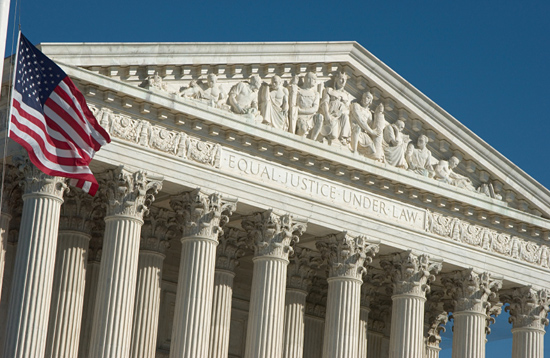 By Michael Doyle and David Lightman, McClatchy Newspapers –
By Michael Doyle and David Lightman, McClatchy Newspapers –
WASHINGTON — The future of health care hangs in the balance, as do some political fates, with the conclusion Wednesday of Supreme Court arguments that showed the justices divided but clearly willing to rule on the major questions at issue.
Longer than any since the 1960s, the arguments that ended Wednesday afternoon both clarified and clouded the potential outcome, with justices on the last day assessing whether most of the 2010 health care law could survive even if its most controversial provision — the individual mandate — were struck down.
Over a total of nearly 61/2 hours this week, the justices suggested that:
—They will almost certainly rule on challenges to the Obama administration’s signature health care law, rather than punt on technical grounds.
—They could very well strike down the health care law’s central requirement that individuals must buy insurance, and the law’s dictate that states expand Medicaid coverage, or even the law in its entirety.
—They will be sharply divided in whatever they do. And because opposing sides won’t be reconciled, it’s more likely that the court itself could become campaign fodder in the fall elections.
Taken together, the arguments foreshadow, by the end of June, a set of binding decisions on one of the country’s most ambitious social programs ever, rendered right in the middle of an election year.
“We cannot avoid decisions simply because the case has political implications,” Chief Justice John Roberts Jr. said Monday morning, speaking of another case but with an unmistakable nod toward the health care cases.
The constitutional validity of the entire 2,700-page Patient Protection and Affordable Care Act was not in question this week. Instead, Florida and 25 other states as well as business groups were challenging several specific provisions concerning mandatory individual insurance coverage and Medicaid expansion at the state level.
On Wednesday, though, the court considered whether the entire law must fail if the central insurance coverage requirement were struck down. Several conservatives think so.
“My approach would say, if you take the heart out of the statute, the statute is gone,” Justice Antonin Scalia declared.
From the liberal side, Justice Elena Kagan suggested that often “half a loaf is better than no loaf,” while some of her colleagues agreed that the court should not move too drastically.
“It’s a question between a wrecking operation and a salvage job,” Justice Ruth Bader Ginsburg said. “And it seems to me the more conservative approach would be salvage rather than throwing out everything.”
The 90-minute argument Wednesday morning will really matter only if the court decides, separately, that the health care law’s so-called individual mandate violates the Constitution. At that point, justices also would have to decide whether the damage to the law can be contained or whether the whole ship necessarily must sink.
“If the individual mandate is unconstitutional, then the rest of the act cannot stand,” insisted attorney Paul Clement, representing Florida and other states challenging the law.
The Obama administration agrees that a few additional provisions of the law are inextricably tied to the individual mandate and must live or die with it. One is the ban on denying coverage to those with pre-existing conditions. Without an individual insurance-buying mandate, this requirement would drive up rates.
But with many provisions of the law already in effect, the administration and advocates maintain that total repeal would throw many Americans for a dangerous loop.
(EDITORS: BEGIN OPTIONAL TRIM)
Twenty-six different provisions took effect in 2010, the law’s first year, and 17 went on the books last year, according to the Kaiser Family Foundation. Nine new provisions are taking effect this year.
Lawmakers designed the phase-in, in part, with the thought that the public would become more supportive of the law once certain provisions took hold.
Among the most popular is a temporary program to provide health care to people with pre-existing conditions who have lacked coverage for at least six months. Another widely praised provision, which took effect in September 2010, allows parents to keep children on their insurance policy up to age 26.
“Think of the millions of Americans whose children are on their parents’ policies,” said Sen. Tom Harkin, D-Iowa, the chair of the Senate Health, Education, Labor & Pensions Committee, at a news conference this week. “They’ll take away this benefit for them?”
Even Senate Republican leader Mitch McConnell of Kentucky, who insists he will try to repeal the health law given a chance, conceded “there are a couple of things that you’ll be able to point to” in the sweeping law that might be popular. Democratic Sen. John Kerry, D-Mass., acknowledged “there’s discussion quietly among some people about the what-ifs” should some or all of the law be struck down.
But the White House insisted there were no contingency plans and that it was “fully confident” the court will uphold the law.
“We remain fully confident in the belief that the Affordable Care Act is constitutional,” said principal deputy press secretary Josh Earnest. He added that the administration is instead “focused on implementing the bill.”
(END OPTIONAL TRIM)
The most controversial provision requires that taxpayers obtain a minimum level of health coverage by 2014. With some exceptions, the uncovered must pay annual fees that start at $95 in 2015 and rise to $695 by 2016; alternatively, the fee may be set as a percentage of household income.
Sharp questioning Tuesday made clear that the court is narrowly divided on this so-called individual mandate, with conservatives and perhaps a key swing justice prepared to strike down the provision as exceeding Congress’ constitutional authority.
“This is a step beyond what our cases have allowed, the affirmative duty to go into commerce,” Justice Anthony Kennedy — the court’s key swing vote between liberal and conservative blocs — said Tuesday. He added that this poses a “heavy burden of justification” for the administration.
Conservatives Scalia and Justice Samuel Alito sounded squarely opposed to the individual mandate. Justice Clarence Thomas stayed silent, but is presumed to oppose the mandate.
On the liberal side, Ginsburg, Kagan and Justice Stephen Breyer sounded sympathetic.
This appears to leave the big part of the case in the hands of either Kennedy or Roberts.








Why would these people think a mandate to buy health insurance work. We have a such a law on car insurance for as long as I can remember and we still can’t get a portion of the people to buy car insurance. That does not even take into account the illegals that are driving with no insurance. You can’t force people to buy something when they have no money to do it with. How stupid can you get.